Search result13 results
-
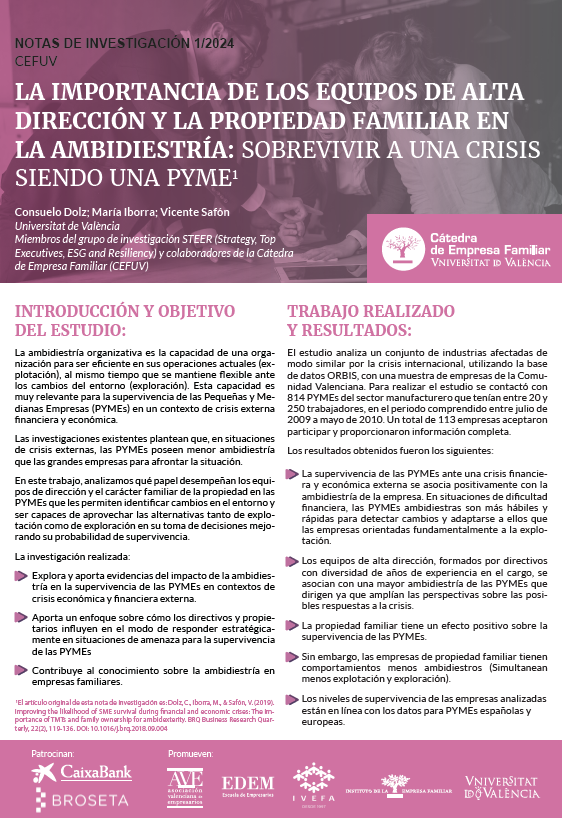
The importance of management teams and family ownership in ambidextrousness: surviving a crisis as an SME
Consuelo Dolz, María Iborra and Vicente Safón (Members of the STEER research group (Strategy, Top Executives, ESG and Resiliency) and collaborators of the Family Business Chair (CEFUV).
València , 2024. Recurs electrònicFind out how Small and Medium Enterprises (SMEs) can successfully face and overcome economic crises. Our research highlights the vital role of organisational ambidestry, diverse top management teams and the influence of family ownership in this process. Explore more about our findings and their impact on business survival here.
-
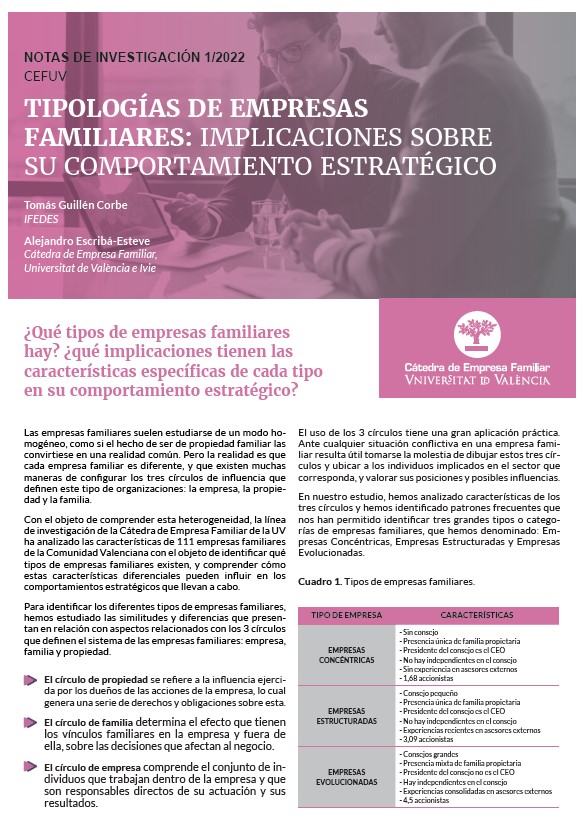
Types of Family Businesses: Implications for their strategic behavior.
Guillén Gorbe, Tomás (Grupo IFEDES) Escribá-Esteve, Alejandro (CEFUV - Universitat de València / Ivie)
Valencia , 2022. Recurs electrònicWhat types of family businesses are there? What implications do the specific characteristics of each type in its strategic behavior? This research note addresses these questions. The full study is published in Guillén Gorbe, T., & Escribá-Esteve, A. (2021). Heterogeneity in Family Firms: exploring governance configurations and their effect on strategies. Harvard Deusto Business Research, X(1), 26-52. https://doi.org/10.48132/hdbr.334
-
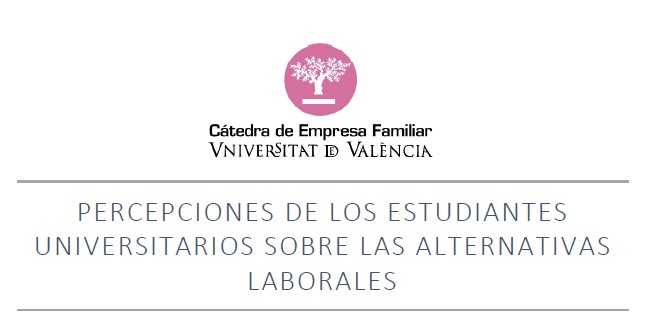
Family Businesses as a potential employer.
Sara Cardona; Alejandro Escribá.
(2022). Projecte fi de grauData about the family firm as an employing entity.
-
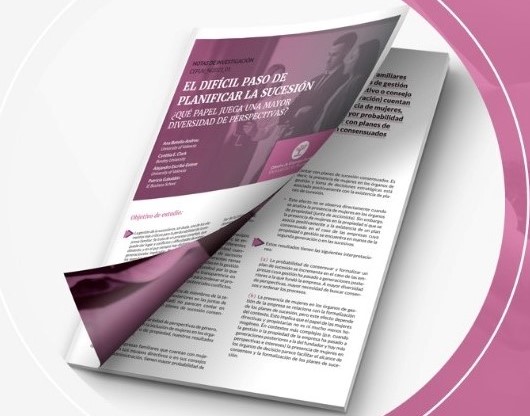
El difícil paso de planificar la sucesión: ¿Qué papel juega una mayor diversidad de perspectivas?
Ana Botella (Universidad de València) Cynthia E. Clark (Universidad de Bentley) Patricia Gabaldón (IE Business School) Alejandro Escribá (Universidad de Valencia e IVIE)
(2021). Recurs electrònic -
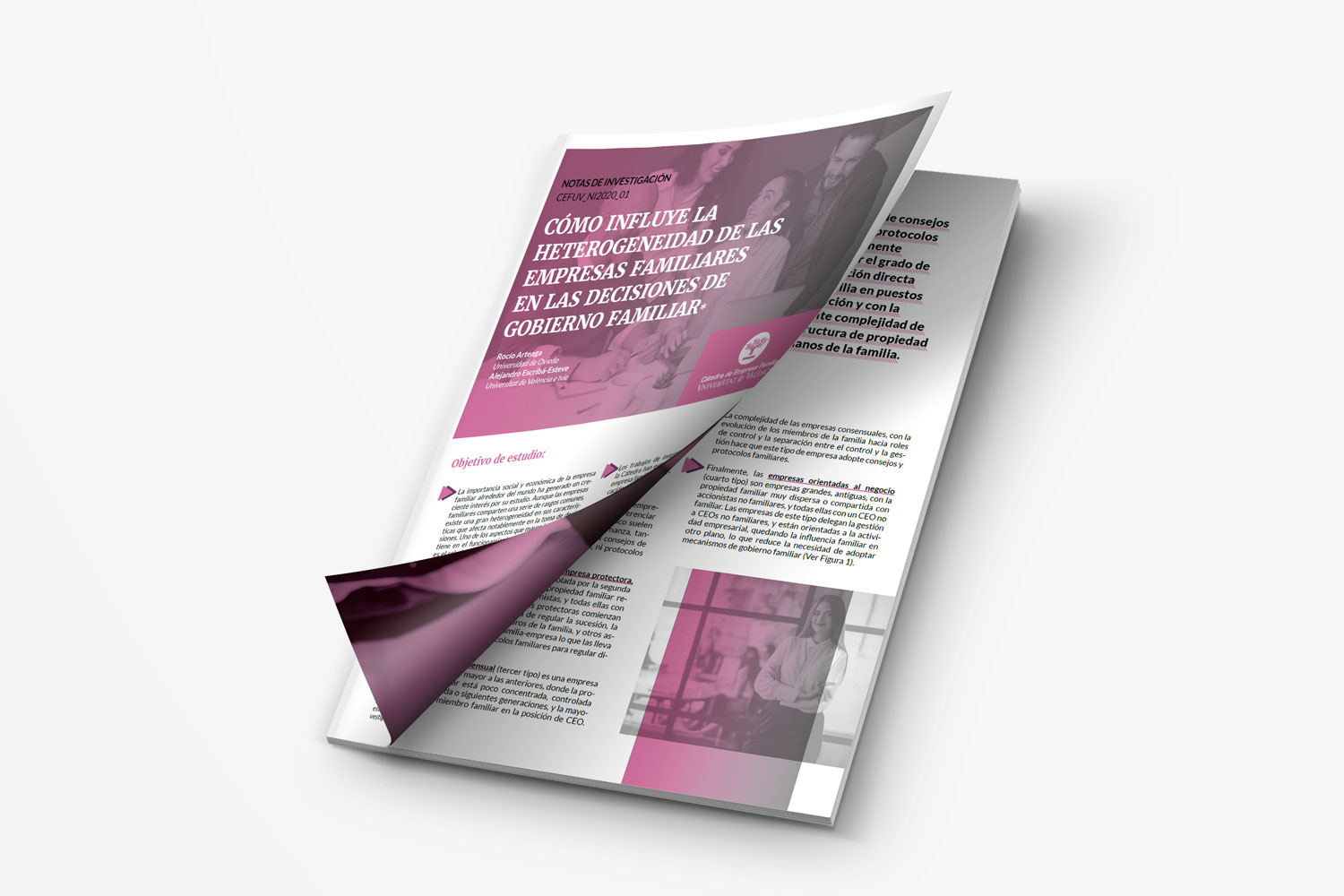
"How Family Business’ Heterogeneity influences family governance decisions".
Rocío Arteaga ((University of Oviedo) Alejandro Escribá (University of Valencia and IVIE).
(2020). Recurs electrònic -
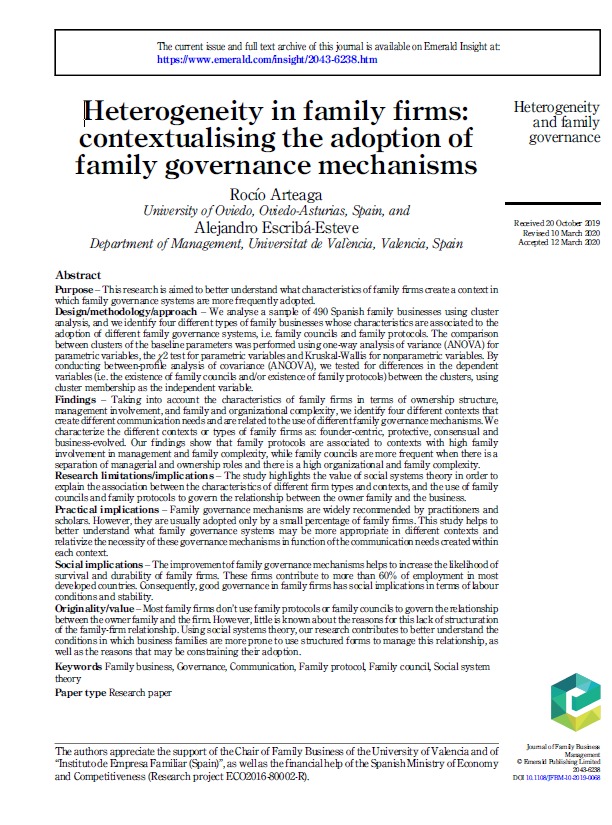
Heterogeneidad en las empresas familiares: Contextualizando la adopción de mecanismos de Gobierno Familiar.
Arteaga, Rocío; Escriba-Esteve, Alejandro
(2020). ArticleThis research is aimed to better understand what characteristics of family firms create a context in which family governance systems are more frequently adopted. Taking into account the characteristics of family firms in terms of ownership structure, management involvement, and family and organizational complexity, we identify four different contexts that create different communication needs and are related to the use of different family governance mechanisms. We characterize the different contexts or types of family firms as: founder-centric, protective, consensual, and business-evolved. Our findings show that family protocols are associated to contexts with high family involvement in...
This research is aimed to better understand what characteristics of family firms create a context in which family governance systems are more frequently adopted. Taking into account the characteristics of family firms in terms of ownership structure, management involvement, and family and organizational complexity, we identify four different contexts that create different communication needs and are related to the use of different family governance mechanisms. We characterize the different contexts or types of family firms as: founder-centric, protective, consensual, and business-evolved. Our findings show that family protocols are associated to contexts with high family involvement in management and family complexity, while family councils are more frequent when there is a separation of managerial and ownership roles and there is a high organizational and family complexity. The study highlights the value of social systems theory in order to explain the association between the characteristics of different firm types and contexts, and the use of family councils and family protocols to govern the relationship between the owner family and the business. Family governance mechanisms are widely recommended by practitioners and scholars. However, they are usually adopted only by a small percentage of family firms. This study helps to better understand what family governance systems may be more appropriate in different contexts and relativize the necessity of these governance mechanisms in function of the communication needs created within each context.
Read more Hide -
Nota de investigación 01/2018: El tamaño de la empresa, fuente de competitividad.
Joaquín Juste Méndez y Alejandro Escribà-Esteve.
(2019). Recurs electrònicMediante esta nota de investigación, basada en el informe sobre "caminos para mejorar la competitividad de las empresas valencianas" de la Asociación Valenciana de Empresarios (AVE), pretendemos demostrar la importancia que tiene el tamaño de las empresas para la competitividad y la productividad de esta.
-
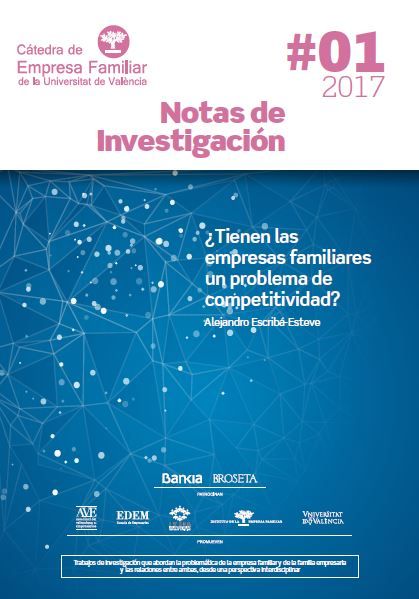
Does the Family Business have a competitiveness problem?
Escribá Esteve, Alejandro
(2017). Recurs electrònicDoes the Family Business have a competitiveness problem?. Cátedra de Empresa Familiar de la Universitat de València. No.1, enero 2017
In the research note # 1 of this new collection, results of a comparative analysis of the competitiveness of family businesses versus non-family businesses are shown. The results of our research show that family businesses suffer, on average, from a lack of competitiveness compared to non-family businesses. This lack is observed above all in the lower presence of family businesses in the groups of companies with the highest competitive level. However, this problem of lower competitiveness does not occur in the case of family businesses that have reached a greater dimension. In fact, the biggest family businesses are more competitive than the non-familiar. This evidence suggests that...
In the research note # 1 of this new collection, results of a comparative analysis of the competitiveness of family businesses versus non-family businesses are shown. The results of our research show that family businesses suffer, on average, from a lack of competitiveness compared to non-family businesses. This lack is observed above all in the lower presence of family businesses in the groups of companies with the highest competitive level. However, this problem of lower competitiveness does not occur in the case of family businesses that have reached a greater dimension. In fact, the biggest family businesses are more competitive than the non-familiar. This evidence suggests that business growth is a facilitating element to avoid or minimize many of the problems that tend to be associated with the family-company relationship, without necessarily losing the positive aspects associated with the family character of the property and the management.
Read more Hide -
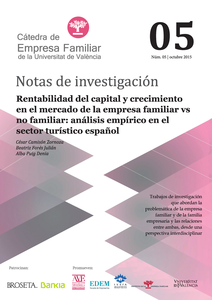
Research note 05/2015: Rentabilitat del capital i creiximent al mercat de la empresa familiar vs no familiar: anàlisi empíric al sector turístic espanyol
Camisón Zornoza, César; Forés Julián, Beatriz; Puig Denia, Alba
(2015). ArticleThis paper analyses tourism firms’ performance, as a measure of their competitive strength through financial results, comparing family business with nonfamily business. This study is justified by the important role of the tourism sector in the Spanish economy and its prospects for global growth, as well as its structural features derived in part by the significant weight of family-owned business. The economic results have been measured on the basis of the return on equity of the company, its sales growth and market share, its production efficiency, and its financial solvency. The objective results indicators come from the company itself or two secondary databases: SABI and INFORMA D & B....
This paper analyses tourism firms’ performance, as a measure of their competitive strength through financial results, comparing family business with nonfamily business. This study is justified by the important role of the tourism sector in the Spanish economy and its prospects for global growth, as well as its structural features derived in part by the significant weight of family-owned business. The economic results have been measured on the basis of the return on equity of the company, its sales growth and market share, its production efficiency, and its financial solvency. The objective results indicators come from the company itself or two secondary databases: SABI and INFORMA D & B. The ex-post analysis is completed with other competitiveness indicators based on self-assessment by the managers in relation to their competition, captured through a primary study with a sample of 1,019 companies.
Read more HideLegal deposit: V-2766-2015
ISBN: 978-84-370-9862-3 -
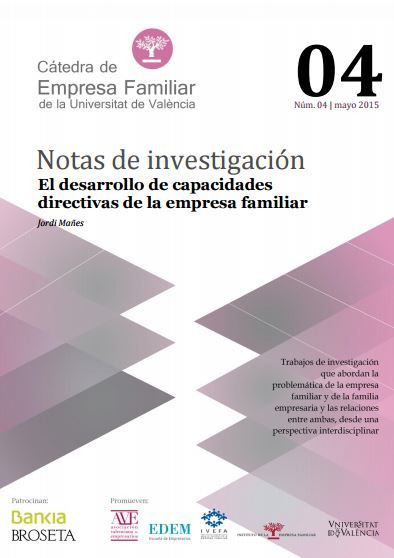
Research note 04/2015: Management skills’ development of Family Business.
Mañes Font, Jordi
(2015). ArticleManagement skills’ development of Family Business. Cátedra de Empresa Familiar de la Universitat de València. No.4, mayo 2015
Identify how the family business’ governance structure affects management capabilities is critical in strategic management research. This paper, using an approach based on RBV and agency theory, tries to find relevant elements in their development and shows how these are affected by succession planning as well as the separation of ownership and control. Using primary data from 541 family businesses in the tourism sector, our results reinforce the role of the formation of the head of the organization and its enterprise-level planning in the development of management capabilities. Furthermore, shows results about the mediation role of succession planning and managerial discretion.
ISBN: 978-84-370-9670-4








